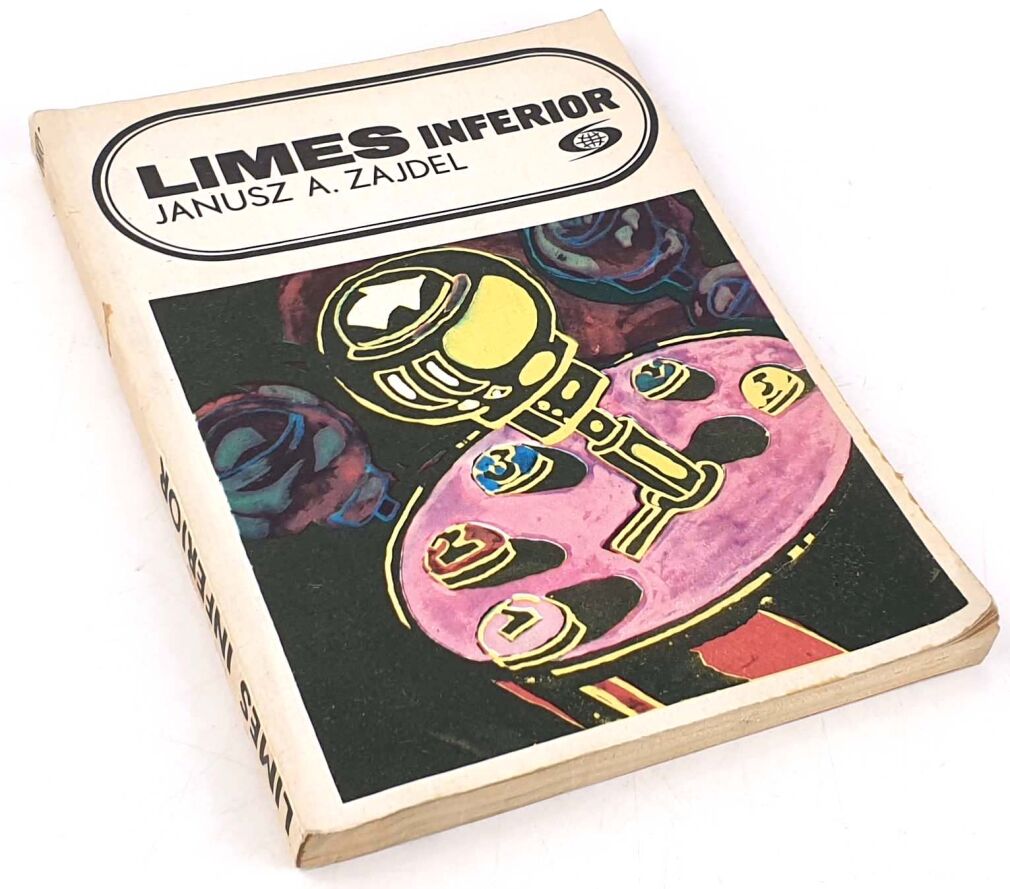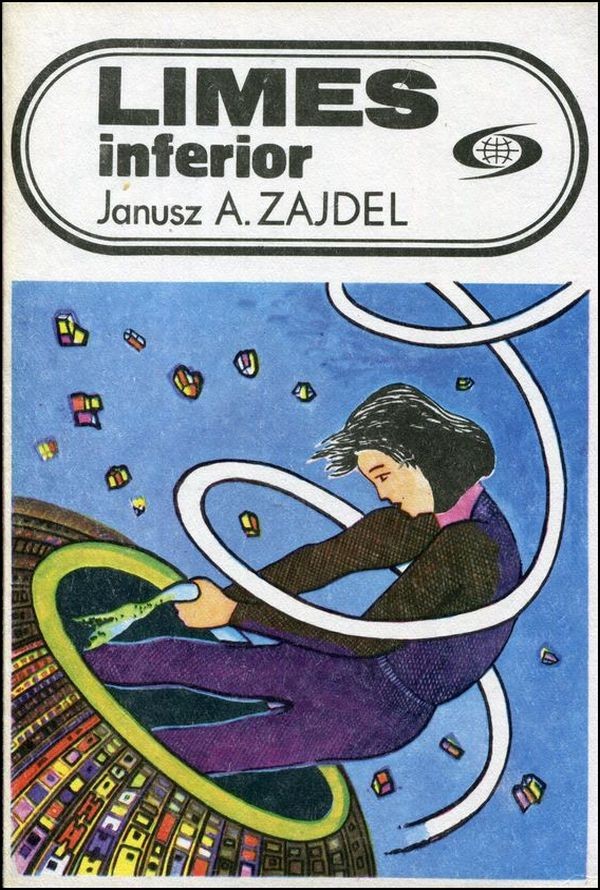 In the future, where people won’t have to work due to technological advancements, Janusz Zajdel’s novel “Limes inferior” (Latin: “Lower Boundary”), not translated into English yet – explores a dystopian reality where individuals, bereft of purpose, end up paying to work out of sheer boredom (business opportunity? :-).
In the future, where people won’t have to work due to technological advancements, Janusz Zajdel’s novel “Limes inferior” (Latin: “Lower Boundary”), not translated into English yet – explores a dystopian reality where individuals, bereft of purpose, end up paying to work out of sheer boredom (business opportunity? :-).
Comprehensive Summary of Limes Inferior by Janusz A. Zajdel
Unfortunately, Limes Inferior has not been translated/published into English yet.
Title: Limes Inferior (Latin: “Lower Boundary”)
Author: Janusz A. Zajdel
Written: 1979–1980
First Published: 1982 by Iskry in the “Fantastyka-Przygoda” series.
Subsequent Editions: Published in 1987, 1997, 2007, as an audiobook in 2010, and as an e-book in 2013.
Setting
The story unfolds in Argoland, a seemingly utopian yet dystopian society governed by a technocratic regime. Argoland is meticulously organised into a strict hierarchy, with citizens divided into seven social classes, ranked from class 6 (lowest)to class 0 (highest), based on intelligence test scores. This rigid system determines individuals’ rights, privileges, and access to resources.
Argoland’s economy revolves around three forms of currency points:
- Red points: A universal basic income, given equally to all, but only useful for purchasing low-quality goods.
- Green points: Allocated based on social class, used for average-quality items.
- Yellow points (“canaries”): Earned through work and required for luxury or high-quality goods.
The Key
All transactions and personal data are stored on a device called the Key, which functions as an ID card, credit card, social status certificate, and surveillance tool. While the Key provides convenience, it also serves as an instrument of control, ensuring compliance with the socio-economic order.
In “Limes Inferior,” the Key functions as a centralised electronic ledger, consolidating a person’s identity, class status, financial points, and everyday transactions into a single device that citizens cannot live without. Much like a ledger, it persistently logs every action, granting the authorities complete oversight and the ability to audit or restrict an individual’s life at any moment. While this mirrors some of the recordkeeping functions of a modern blockchain ledger, the Key differs fundamentally – blockchain ledgers are designed to be decentralised and secure through cryptography, whereas the Key is operated by a central authority that uses it for surveillance and control, highlighting the novel’s central theme of technological power as a tool of social domination rather than personal empowerment.
When Janusz Zajdel wrote “Limes Inferior” in 1982, the concept of a blockchain ledger had not yet been developed or entered public awareness. The novel’s Key—a centralised, electronic device serving as an identity, transaction, and social status ledger – was Zajdel’s own prophetic invention, inspired by the emerging computerisation and control mechanisms of late-twentieth-century societies. Zajdel, despite being a physicist and science fiction author, had no documented exposure to these early cryptographic ledger ideas. The actual design and broad understanding of decentralised, cryptographically-secured blockchains only emerged much later, starting in the 1990s and becoming public knowledge with Bitcoin in 2008-2009. While David Chaum proposed some cryptographic ledger concepts in the early 1980s, these ideas remained isolated in academic circles and did not shape mainstream technological thinking until blockchain’s breakthrough with Bitcoin decades later. Zajdel’s depiction therefore pre-dates and is independent of blockchain: it arises from a dystopian anticipation of surveillance and total control, not from an existing framework of decentralised digital records.

Plot
The protagonist, Adi Cherryson, known by the nickname Sneer, is a “lifter” who illegally helps clients manipulate intelligence test results to upgrade their social class. Officially a class 4 citizen, Sneer secretly possesses the intellect of a class 0 individual. His life of quiet scheming and profit-making takes a dramatic turn when he uncovers disturbing truths about Argoland’s system and the forces that sustain it.
As Sneer’s journey progresses, he becomes entangled in a series of revelations and challenges:
- He loses and later recovers his Key after encountering Alicja, a mysterious woman who claims to be a class 0 like him.
- He is recruited by the Supervisory Council of Agglomeration to oversee a research facility, only to discover that the social classification system extends beyond class 0. There are “super-zeroes”—individuals of even greater intelligence who secretly govern Argoland.
- Sneer encounters Karl Pron, a fellow lifter who tests a modified Key that provides unlimited points. This experimental Key becomes a focal point of intrigue, with police and other factions vying to control its power.
The climax reveals that Argoland’s socio-economic structure was not devised by humans but was imposed by an alien race. These extraterrestrials use human collaborators to enforce their system, presenting it as an “ideal society” while systematically suppressing human potential. Sneer ultimately discovers the truth about Earth’s subjugation but faces a dilemma: Should he join the elite group secretly working to undermine alien control or seek another path?
The novel concludes ambiguously. In the final scene, Alicja reappears, showing Sneer a way to save humanity. The ending draws on elements of Lewis Carroll’s Alice’s Adventures in Wonderland, hinting at a surreal and philosophical resolution. A suggestion of intervention by another alien race offers a glimmer of hope, but the ultimate fate of Argoland is left to the reader’s interpretation.
“Czas to życie. Wolny czas to wolne życie.”
(“Time is life. Free time is free life.”)
Themes
Limes Inferior explores a rich tapestry of themes:
- Totalitarianism and Social Control: The class system and Key technology embody the dangers of technocratic rule, where freedom is subordinated to rigid hierarchies.
- The Dangers of Technological Dependency: The novel critiques society’s reliance on systems that promise convenience but enforce compliance and surveillance.
- Class Struggle and Social Mobility: The rise of lifters and downers highlights the corruption and absurdity of meritocratic ideals in a fundamentally unequal system.
- Resistance and Solidarity: Sneer’s gradual awakening reflects the broader potential for rebellion against oppressive systems.
- Allegory of Political Oppression: The alien rulers serve as a metaphor for external domination, particularly reflecting Poland’s experience under Soviet influence during the Cold War.
Zajdel’s critique extends beyond communism to encompass flaws in capitalist systems, imagining a dystopian future that merges the worst aspects of both ideologies.
“Jak wśród ślepców królem może być jednooki, tak wśród idiotów mędrcem może być debil.”
(“Just as among the blind, the one-eyed man can be king, so among idiots, a moron can be a sage.”)
A Paradoxical Economy of Idleness
“Limes Inferior” imagines a society in which technological advancement and pervasive automation have rendered traditional work nearly obsolete, yet rather than leading to universal leisure or fulfillment, this post-labor society spirals into absurdity. People in Argoland do not need to work for survival, but instead, out of boredom and a lack of purpose, they trade and even pay for the privilege to perform tasks that are functionally unnecessary. This inversion of the work-value relationship – where citizens must expend resources or engage in clandestine exchanges just to access the semblance of activity – exposes a social order emptied of meaning, where economic life becomes a hollow ritual sustained more by arbitrary class distinctions and institutional control than by production or true need. Zajdel’s critique highlights the dangers of technocratic utopias that promise abundance but ultimately strip individuals of autonomy and purpose, revealing the farcical core of a system that perpetuates idleness while pretending to cherish industriousness.
„Zmuszony do codziennego bezsensownego krążenia po wyznaczonej orbicie, człowiek rzeczywiście upodabnia się do bezrozumnej cząstki, zdanej na przypadkową grę sił działających w tym złożonym układzie. Iluzoryczna zmiana własnego statusu społecznego polega jedynie na zamianie jednej orbity na inną, gdzie dalej trwa obłędne krążenie — intensywny ruch po krzywej zamkniętej, nie posuwający obiektu ani o krok w kierunku jakiegoś realnego celu.”
(“Compelled to circle daily on a senseless orbit, a person truly resembles a mindless particle, subject to the random play of forces in this complex system. The illusory change of one’s social status is merely an exchange of one orbit for another, where the mad circling continues — an intense movement along a closed curve, not advancing the object in any real direction.”).
Characters
- Sneer (Adi Cherryson): A clever and pragmatic lifter who embodies the duality of benefiting from the system while ultimately challenging it. Inspired by Polish sci-fi writer Adam Wiśniewski-Snerg.
- Alicja: A mysterious woman who helps Sneer uncover the truth about Argoland. She parallels Lewis Carroll’s Alice, guiding Sneer toward deeper understanding.
- Karl Pron: A fellow lifter and unlucky accomplice who tests the experimental Key.
- Filip: A client who wishes to elevate his social class after winning the lottery.
- Matt: Sneer’s friend, an intelligent man trapped in class 6 due to systemic errors.
Interpretation
The title Limes Inferior (“Lower Boundary”) symbolises the suppression of human potential beneath an artificial social ceiling. The novel critiques the commodification of intelligence and the dehumanising effects of hierarchical systems, illustrating how such structures perpetuate inequality and diminish individuality.
The revelation of alien control adds depth to the narrative, portraying oppression as both internal (human collaborators) and external (alien rulers). This duality underscores the complicity of individuals in sustaining unjust systems.
Reception and Legacy
Limes Inferior is celebrated as one of Zajdel’s finest works and a cornerstone of Polish science fiction. Critics and authors, including Marek Oramus, Jacek Dukaj, and Stanisław Lem, have praised its intellectual depth and narrative brilliance. The novel is frequently compared to classics like Orwell’s 1984, Fahrenheit 451 by Ray Bradbury and Vonnegut’s Player Piano, though it uniquely critiques hybrid political systems that merge the flaws of communism and capitalism.
The novel’s themes of surveillance, class stratification, and technological dependency remain strikingly relevant in today’s digital age. Its nuanced exploration of freedom, power, and resistance ensures its place as a timeless work of dystopian literature.
Publication and Translation
Despite its acclaim in Poland, Limes Inferior has not been officially translated/published into English, limiting its international recognition. However, its universal themes make it highly relevant for global audiences, especially in an era increasingly shaped by questions of social control and technological ethics.
Conclusion
Limes Inferior masterfully combines a gripping narrative with profound social commentary. Its exploration of class, power, and oppression invites readers to reflect on the structures that govern their own lives. With its ambiguous ending and philosophical depth, the novel continues to resonate as a thought-provoking examination of humanity’s struggle for freedom and meaning in the face of systemic control.
„Limes inferior – granica, której nie wolno przekroczyć. Próg, pod którym musisz się zmieścić, jeśli nie chcesz zginąć. Dolna granica twoich możliwości.”
(“Limes inferior – a boundary that must not be crossed. A threshold under which you must fit, if you do not wish to perish. The lower limit of your possibilities.”).
This succinctly encapsulates the novel’s central message about the suppression of human potential by artificial, system-imposed constraints.

